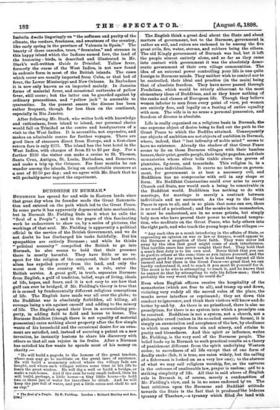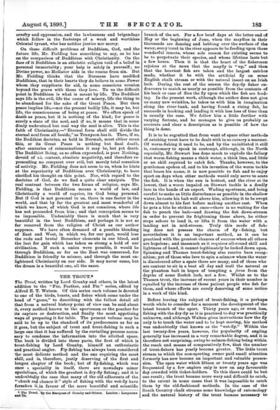BUDDHISM IN BURMAH.*
BUDDHISM has spread far and wide in Eastern lands since that great day when its founder made the Great Renuncia-
tion and entered on the path which led to the Great Peace. In some parts it has apparently degenerated into mechanism, but in Burmah Mr. Fielding finds in it what he calls the "Soul of a People"; and in the pages of this fascinating work he endeavours to show us, by a series of pictures, the workings of that soul. Mr. Fielding is apparently a political official in the service of the British Government, and we do aot doubt he has discharged his tasks faithfully. But his sympathies are entirely Burmese ; and while he thinks ." political necessity" compelled the British to go into Burmah, he also seems to hold that their presence there is mostly harmful. They have little or no re- spect for the religion of the conquered, their hard materi- alism has expelled poetry from the land, and only the worst men in the country will, as a rule, enter the British service. A great gulf, in truth, separates Burmese from English, a gulf of tradition, belief, ways of living, ideals of life, hopes, and fears, and it is not easy to see how that gulf can ever be bridged, if Mr. Fielding's theory is true that it is caused by fundamentally different religions conceptions of life. The English have made war all over the globe; to the Buddhist war is absolutely forbidden, all killing, all revenge being a sin against oneself and adding to the misery of life. The English spend their lives in accumulating pro- perty, in adding field to field and house to house. The Burmese Buddhist (though there is not equality of material possession) cares nothing about property after the few simple wants of his household and the occasional desire for an orna- ment are satisfied, and, instead of securing a patent on a new invention, he instantly hastens to share his discovery with others so that all can rejoice in its fruits. After a Burman has satisfied his few wants he spends most of his money on charity :—
"He will build a pagoda to the honour of the great teacher, where men may go to meditate on the great laws of existence. He will build a monastery school where the village lads are taught, and where each villager retires some time in his life to learn the great wisdom. He will dig a well or build a bridge, or make a rest-house. And if the sum be very small indeed, then he will build, perhaps, a little house—a tiny little house—to hold two or three jars of water for travellers to drink. And he will keep the jars full of water, and put a little cocoa-nut shell to act as cup."
• The Soul of a People. By H. Yielding. London Richard Bentley and Son. -
The English think a great deal about the. State and about matters of government, but to the Burmese, government is rather an evil, and rulers are reckoned to be among the five great evils, fire, water, storms, and robbers being the others.
The old Kingly government of Burmah was bad, but it left the people almost entirely alone, and so far as they came into contact with government it was the absolutely demo- cratic government of their own village communities. The idea of an external power controlling your life is one quite foreign to Burmese minds. They neither wish to control nor to be controlled, their ideal and. practice (in the main) being that of absolute freedom. They have never passed through Feudalism, which would be utterly abhorrent to the most elementary ideas of Buddhism, and so they know nothing of the ranks and classes of European life. Though they believe women inferior to men from every point of view, yet women are entirely free, and legally on a footing of entire equality with men. The wife is in no sense a personal possession, and freedom of divorce is absolute.
Life is really organised on a religions basis in Burmah, the one supreme object of desire being to find out the path to the Great Peace to which the Buddha attained. Consequently our objects of ambition are not objects of ambition in Burmah, where, indeed, that "last infirmity of noble mind" seems to have no existence. Already the shadow of that Great Peace
seems to lie on these Burmese villages with their bamboo houses, their quiet, gentle people, their bright pagodas, and their monasteries whose silver bells tinkle above the groves of
plantains, fig-trees, and tamarinds. This religion is, in a sense, pure individualism. It exerts no influence on govern- ment, for government is at best a necessary evil, and Buddhism has no compromise with evil in any shape or form. No Buddhist Constantine could ever arise to marry Church and State, nor would such a being be conceivable in the Buddhist world. Buddhism has nothing to do with marriage, for marriage is merely a contract between
individuals and no sacrament. As the way to the Great Peace is open to all, and is so plain that none can err, there
is no need of a priesthood ; and the monks in the monasteries, it must be understood, are in no sense priests, but simply holy men who have proved their power to withstand tempta- tion, who meditate on the Great Peace, who help others into the right path, and who teach the young boys of the villages :—
" Any such idea as a monk interfering in the affairs of State, or expressing an opinion on war or law or finance, would appear to the Burmese a negation of their faith. They were never led away by the idea that good might come of such interference. This terrible snare has never caught their feet. They hold that a man's first duty is to his own soul. Never think that you can do good to others at the same time as you injure yourself, and the greatest good for your own heart is to learn that beyond all this turmoil and fret there is the Great Peace—so great that we can hardly understand it, and to reach it you must fit yourself for it. The monk is he who is attempting to reach it, and he knows that he cannot do that by attempting to rule his fellow-man ; that is probably the very worst thing he could do."
Even when English officers receive the hospitality of the monasteries (which are free to all), and tramp up and down, violating very rudely all the sacred rules of the place, the monks never interfere or reprimand ; they set down this conduct to ignorance, and think their visitors will know and do better by-and-by. As there is no priesthood, there is also no
proselytism, for there is no system into which a proselyte can be received. Buddhism is not a system, not a church, not a philosophic creed (unless in its so-called esoteric forms), it is
simply an enunciation and acceptance of the law, by obedience to which man escapes from sin and misery, and attains to purity and blessedness. And this spirit or influence, writes Mr. Fielding, is the very soul of the Burmese people. The belief leads up in Burmah to such practical results as a theory
of punishment different from the spirit underlying Western codes; to sacredness of all life except that of one form of deadly snake (fish, it is true, are eaten widely, but the calling of a fisherman is looked on as a very low one); to the absence of what we may call religions worship, for, as the universe is the outcome of unalterable law, prayer is useless; and to a. striking simplicity of life. All that is said above of English rule in Burmah is, of course, merely a condensation of Mr. Fielding's view, and is in no sense endorsed 1:1 us. The best criticism upon the Burmese and Buddhist attitude towards the State is the fact that it produce /the hideous tyranny of Theebaw,—a tyranny which filled e land with
cruelty and oppression, and the lawlessness and brigandage which follow in the footsteps of a weak and worthless Oriental tyrant, who has neither justice nor mercy.
On those difficult problems of Buddhism, God, and the future life, Mr. Fielding has something to say, as he has on the comparison of Buddhism with Christianity. On the face of it Buddhism is an atheistic religion void of a belief in personal immortality ; your help is solely in yourself ; no Divine power, no Mediator aids in the rescue from sin. But Mr. Fielding thinks that the Burmese have modified Buddhism, that in their hearts they do believe in some Power whom they supplicate for aid, in some conscious reunion beyond the grave with those they love. To us the difficult point in Buddhism is what is meant by life. The Buddhist says life is the evil, life the cause of misery, life the thing to be abandoned for the sake of the Great Peace. But then peace implies life,—not the present bodily life, it may be, but life, the consciousness of being at peace. We often speak of death as peace, but it is nothing of the kind; for peace is surely a state of the soul, and if so, it means that in some dimly understood but real way the soul is alive. This is the faith of Christianity,—" Eternal form shall still divide the eternal soul from all beside," as Tennyson has it Then, if so, the Buddhist doctrine, as held in Burmah, must either mean this, or its Great Peace is nothing but final death, after centuries of reincarnations it may be, but yet death. The Buddhist Being, as so often expounded, is pure Nothing, devoid of a-a. content, absolute negativity, and therefore re- presenting no conquest over evil, but merely total cessation of activity. Mr. Fielding does not seem to us, when he hints at the superiority of Buddhism over Christianity, to have clarified his thought on this point. Nor, with regard to the doctrine of God, do we find a quite clear analysis. The real contrast between the two forms of religion, says Mr. Fielding, is that Buddhism means a world of law, and Christianity a world of caprice, its God being personaL But if God is not personal to us, there is one factor in the world, and that by far the greatest and most wonderful of which we know, of which God is not conscious, where life has not proceeded from him ; and that conception seems to us impossible. Undeniably there is much that is very beautiful in the beet Buddhism, and perhaps it is not so far removed from the religion of Christ as our author supposes. We have often dreamed of a possible blending of East and West, in which we, for our part, would lose the rude and brutal Berserker elements in our blood, and the lust for gain which has taken se strong a hold of our civilisation. If such a union were possible, it would be through Buddhism, so far as the East was concerned, for Buddhism is friendly to science, and through the most en- lightened Christianity on our side. It may never come, but the dream is a beautiful one, all the same.



































 Previous page
Previous page